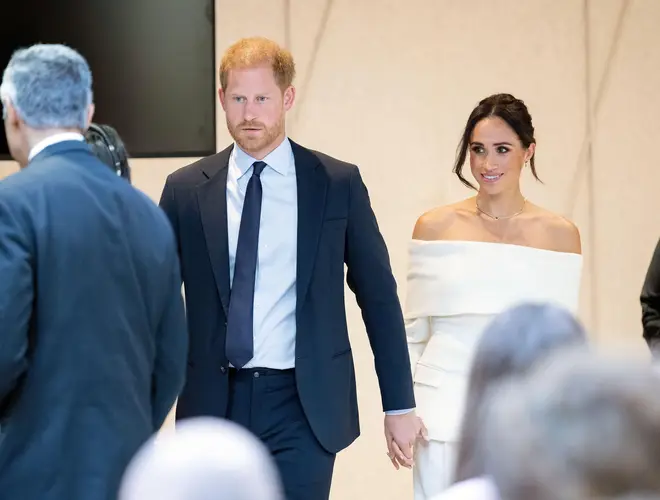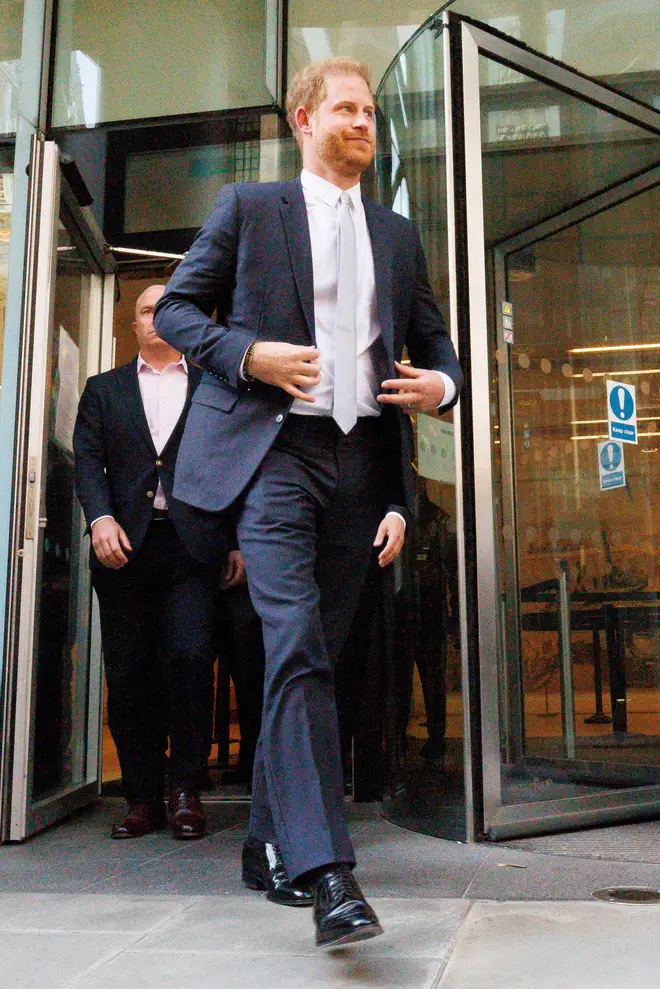
Paul Brand 10am - 12pm
7 December 2023, 14:51 | Updated: 7 December 2023, 15:03

Prince Harry has said he and Meghan Markle were “forced” to leave Britain and move to the USA in order to keep their children safe.
In the Duke of Sussex’s written witness statement as part of his legal challenge against the Home Office over his security arrangements, Harry said he and his wife were “forced” to leave the country in 2020.
At a hearing in London on Thursday, the duke's barrister, Shaheed Fatima KC, said Harry did not accept that it was a "choice" for him to have stopped being a "full time working member of the royal family".
The lawyer read out an excerpt from the duke's statement in which he said: "It was with great sadness for both of us that my wife and I felt forced to step back from this role and leave the country in 2020.
"The UK is my home. The UK is central to the heritage of my children and a place I want them to feel at home as much as where they live at the moment in the US. That cannot happen if it's not possible to keep them safe when they are on UK soil.
"I cannot put my wife in danger like that and, given my experiences in life, I am reluctant to unnecessarily put myself in harm's way too."

Earlier this week Harry claimed he had been "unjustifiably treated less favourably than others" over his security arrangements when he's in the UK.
The Duke of Sussex is taking legal action against the Home Office over a decision not to allow him to fund the same protection as when he was a working royal.
The court heard the impact of a "successful attack" on Harry should have been considered as part of a decision to change his security arrangements in the UK.
The Home Office committee that made the decision after he announced that he was stepping back from his role as a working royal, had “failed to treat (him) as it treated others”, the court also heard.
Lawyers for Harry say a failure to carry out a risk analysis meant he was treated in an "unlawful and unfair" way by the move to provide him with a different degree of protection when visiting the country.
The duke has brought legal action against the Home Office over the February 2020 decision of the Executive Committee for the Protection of Royalty and Public Figures (Ravec), with a two-and-a-half day hearing starting on Tuesday.
The Government is opposing Harry's case, saying he is treated in a "bespoke manner", with his security provision considered by Ravec in "appropriate circumstances".
A large part of the hearing in London is set to be held in private, without the press or public present, due to confidential evidence over security measures being involved in the case.
Shaheed Fatima KC, for Harry, told an initial public part of proceedings: "This case is about the right to safety and security of a person. There could not be a right of greater importance to any of us."
She told the court Ravec's written policies showed "the unlawful and unfair treatment" of Harry.
The barrister said a "crucial" part of Ravec's approach was an analysis carried out by the Risk Management Board (RMB), but added: "In this case Ravec chose not to follow its own written policy. Ravec chose not to do a RMB risk analysis."
Ms Fatima said Ravec had chosen "a far inferior procedure" in relation to the "critical safeguards" built into its policies, claiming it was the "first time that Ravec has ever decided to deviate from this policy in this way".
The lawyer said Ravec's decision was taken when the duke was "a full-time working member of the royal family" and "plainly still in the Ravec cohort".
Ms Fatima said Ravec had failed to tell Harry, who now lives in North America with wife Meghan and their children Archie and Lilibet, that he was not being treated "consistently and equally" with others nor why.
Ravec has delegated responsibility from the Home Office over the provision of protective security arrangements for members of the royal family and others, with involvement from the Metropolitan Police, the Cabinet Office and the royal household.
In written arguments, Ms Fatima said the impact on the UK's reputation if he was harmed should have been taken into account.
She said: "Ravec should have considered the 'impact' that a successful attack on the claimant would have, bearing in mind his status, background and profile within the royal family - which he was born into and which he will have for the rest of his life - and his ongoing charity work and service to the public.
"Ravec should have considered, in particular, the impact on the UK's reputation of a successful attack on the claimant."
Ms Fatima said Harry was entitled to make representations to Ravec before the change in his security, adding that his "knowledge/understanding was limited".
She said: "He would have made further representations directly to the Ravec chair if he had had the relevant information."
She said the "case-by-case" security provision for the Duke of Sussex leads to "excessive uncertainty".
"The purpose of security is to mitigate the risk of a successful attack," Ms Fatima said.
"The risk has arisen in relation to the claimant because of a factor over which he has no control and which will affect him for the rest of his life, ie, his place in the royal family."
Ms Fatima said Harry was "plainly" part of the group that Ravec has to consider, adding that the risk he faces "arises from his birth and ongoing status, as the son of" the King.
She continued: "The claimant's consistent position has been - and remains - that he should be given state security in light of the threats/risks he faces."
Sir James Eadie KC, for the Home Office, said in written arguments that the duke has been treated in a lawful, "bespoke manner" over his security.
He said: "In considering whether to provide protective security to any such individual... Ravec considers the risk of a successful attack on that individual.
"In summary, Ravec considers the threat that an individual faces, which is assessed by reference to the capability and intent of hostile actors, the vulnerability of that individual to such an attack, and the impact that such an attack would have on the interests of the state."
He continued: "As a result of the fact that he would no longer be a working member of the royal family, and would be living abroad for the majority of the time, his position had materially changed.
"In those circumstances, protective security would not be provided on the same basis as before.
"However, he would, in particular and specific circumstances, be provided protective security when in Great Britain."
Sir James said there are "finite public resources" for state-provided protective security and that it was for Ravec to decide who it took responsibility for.
He continued: "It is judged to be right in principle that the allocation of finite public resources which results from protective security provided by the state be allocated to individual who are acting in the interests of the state through their public role.
"Ravec has treated the claimant as a person who falls outside the Ravec cohort, but who nonetheless enters the cohort occasionally when in Great Britain."
The hearing before Mr Justice Lane is due to conclude on Thursday, with a ruling expected at a later date.